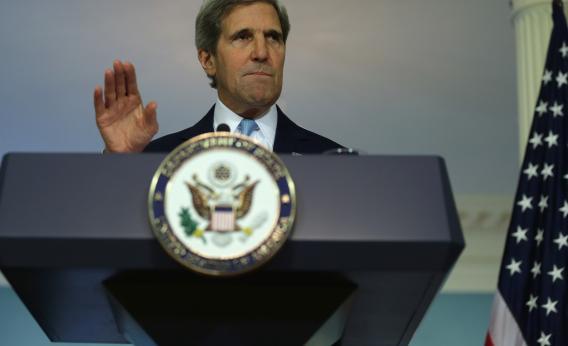“The Case for Doing Nothing in Syria: Bombing is risky, illegal, and unlikely to help,” by Matthew Yglesias. Conventional wisdom in Washington says Obama has “no good options in Syria.” But Yglesias argues President Obama has an excellent option: do nothing. Military engagement has potentially large downsides and essentially no upsides, he writes. Obama should condemn violations of humanitarian law in Syria. But when it’s unclear just how much military strikes would weaken Bashar al-Assad’s regime, or how a weakened Assad would serve American or humanitarian interests, Obama’s best course of action is inaction.
“Obama’s War of Words: President Obama was supposed to be the wise and careful communicator. On Syria, his words have done nothing but corner himself,” by John Dickerson. A year ago, Obama said Syria’s use of chemical weapons would cross a “red line.” On the eve of a U.S. attack on Syria, Obama is hemmed in by his own rhetoric in a way that many, back in 2008, would have associated with George W. Bush instead of the man who won the Nobel Peace Prize based mostly on the quality of his words, Dickerson writes.
“If You Send Your Kid to Private School, You Are a Bad Person: A manifesto,” by Allison Benedikt. If every single parent sent every single child to public school, public schools would improve, Benedikt reasons, so sending your children to private school makes you a bad person. Benedikt raises and dismisses a number of reasons parents cite for sending their kids to private school, and argues that a “moral adjustment” in attitudes about public education now would reap rewards for the common good several generations from now.
“Don’t Text to a Driver! Could you be sued for sending a text to someone who’s driving? A New Jersey court says yes,” by Emily Bazelon. This week an appeals court in New Jersey suggested that if you text a driver, you too could be in legal trouble. Passing stiffer state laws to crack down on drivers is more logical and useful than imposing liability on texters who are not in the car, Bazelon argues. But the New Jersey court’s abundance of caution is understandable since texting while driving continues to be a massive and bedeviling problem.
“Four Reasons You Shouldn’t Exist: Physics says you’re an impurity in an otherwise beautiful universe,” by Dave Goldberg. You’re almost unfathomably lucky to exist, in almost every conceivable way, writes Goldberg, the author of a new book about the beautiful symmetries of the cosmos. The universe is “actively hostile” toward the human species, which Goldberg says are “decidedly asymmetric lumps that ruin the otherwise perfect beauty of the cosmos.”
“End the Ban on Gay Blood Donation,” by Mark Joseph Stern. Russia recently announced it was reinstating its ban on blood donations from gay men. “It’s easy to be outraged at Russia’s blatantly homophobic move to forbid gay blood donations—until you remember that the United States does the exact same thing,” Stern writes. He argues for ending the policy that ignores science, curbs blood donations, and telegraphs to gay people that they are diseased. Even as Moscow slides further into vicious homophobia, the United States’ discriminatory practice of banning blood from gay donors undermines the country’s claim to a moral high ground over Russia on gay rights.
“A Spectacularly Awful Week in Rape: When courts can’t get even the easy cases right, we’re in big trouble,” by Dahlia Lithwick. On Monday a former teacher in Montana was sentenced to 30 days in prison for having sex with a troubled 14-year-old student when he was 49. This decision comes on the heels of a Massachusetts case where a plaintiff sued the commonwealth in federal court for forcing her into a long-term relationship with her rapist. These cases amount to a spectacularly awful week in rape, Lithwick writes, and send a worrisome signal about where the U.S. is heading in the law of sexual assault.
“Messi and Neymar: Will the world’s greatest player and Barcelona’s new prodigy play well together?” by Ken Early. Barcelona recently signed Neymar da Silva Santos, Brazilian football’s biggest star, to a €57 million contract. Early writes the futbolista now has two seemingly irreconcilable missions: justify his price tag without disturbing the club’s “delicate ecosystem.” But Early argues Neymar wouldn’t be a real superstar if he didn’t want to encroach on the turf of Lionel Messi, Barcelona’s forward and the world’s greatest player. Early’s article explores whether Barcelona is now a ship with two captains.
“Thanks, Smilin’ Bob: How a court case over “natural male enhancement” pills helped improve email privacy,” by Nate Anderson. Enzyte was once such a staple of late-night TV advertising in the United States that its unspeaking spokesman Smilin’ Bob became not only the “envy of his neighborhood” but a cultural icon, Anderson writes. Many customers lured by the penis pills’ promise of “natural male enhancement” were disappointed by the results. Many more were infuriated by the (purposely) difficult cancellation procedure. In a bizarre turn of events, the controversy ultimately led to evidence that would earn the CEO a 25-year criminal sentence and add a new wrinkle to the way the Fourth Amendment protection against warrantless searches applies to email.
“I’ve Read 500 Cover Letters for Entry-Level Media Jobs: Here are 12 tips your career counselor hasn’t told you,” by Katherine Goldstein. Many young people seem to have no idea how to apply for a job, Goldstein writes. Based on roughly 500 cover letters that have crossed her desk, Goldstein concludes there may be a fundamental lack of understanding of how to sell oneself to a prospective employer. Among the dozen tips she offers entry-level media applicants are: Keep it short, be your own best advocate, and explain how selecting you will benefit me.
